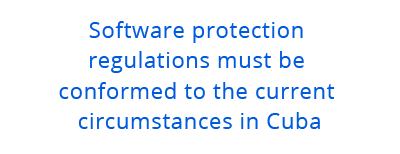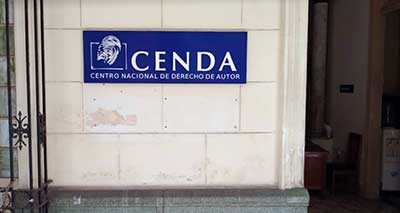Cuba’s Private Software Industry: Exports, Intellectual Property, and Contracts
By Yordanka Castillo
Lawyer
The level of human capital in Cuba’s private software industry is more typical of developed countries. Now the country needs a regulatory framework that protects and develops the software industry for the good of the Cuban economy.
“Computer equipment programmers,” known in the international software industry as “developers,” are now permitted to operate under the recently expanded list of allowable, non-state professional activities (private businesses) listed in the National Classification of Economic Activities (CNAE), Section J.
This authorization created an opportunity to legalize projects that young entrepreneurs had already been working on, as well as to support new projects that contribute to the development of the software industry. Previously, Cuban state-owned enterprises dominated that market.
Private sector regulations in Cuba establish the scope of these activities as follows: “computer equipment programmers develop, market, implement, deploy and provide technical support for computer programs, applications and services through contracts with natural and legal persons and comply with the regulations established by the Ministry of Communications in Cuba (MINCOM).”
In addition to regulating and supervising these activities, MINCOM controls the record and registration of Cuban software products that are marketed on and off the island. This industry, as in the rest of the world, is one of the most profitable economic activities for private businesses in Cuba and plays an essential role in the growth of the private sector. It provides web development services and software and applications for other private businesses, thus contributing to their publicity and management. For example, private restaurants use software to improve their accounting, administration, advertising, and food delivery services. During the COVID-19 pandemic, these software products have been essential to the survival of these businesses.
At one point, the authorization of private developer businesses was revoked, partially due to the Cuban government's inability to control the commercialization and export of products and services, which was not regulated as deemed outside of the definition self-employment (trabajo por cuenta propia). However, Cuba’s policies and legal framework establish that the Ministry of Foreign Trade and Foreign Investment (MINCEX) regulates and supervises the export of products and services, so this type of activity requires MINCEX authorization.
Several developers were sanctioned for providing services to foreign companies, including having their licenses revoked and offices closed. Those who had previously acquired licenses and still held them had the option of hiring other developers under the category of “contract workers.” In this way, those businesses were able to continue and grow, despite the limitations.
As part of Cuba’s economic and social strategy approved in mid-2020 and in line with the country's economic objectives to increase exports, the Cuban government promulgated a series of regulations authorizing private businesses to export their products and services for the first time. These regulations form part of the country’s goal to grow the economy by increasing exports, including for the first time from the private sector. This opening could present a great opportunity for the private software industry in Cuba, but ...
Will Cuban Private Sector Developers be Able to Export their Products and Services?
The answer is yes. They may export their products and services. Decree 359/2019, issued by the Council of Ministers, which regulates the activities of the state and private software industry in Cuba, establishes that non-state enterprises may export goods and services. Resolution 315/2020, issued by MINCEX, establishes that non-state enterprises “may export goods and services generated within the framework of their activities.”
No private business is excluded from this benefit so long as it carries out its activities legally. This regulation dictates the procedure for exporting through intermediary state companies, as well as their legal relationship to them and to their clients. It also designates the state enterprises that are authorized to export products and services in the software industry.
In the software industry the entities are: Softel, Desoft, CINESOFT, and CITMATEL. Developers can import equipment and supplies through Solintel S.A. For more details, developers must be aware of the directory of terms of products and services of each of the aforementioned enterprises. Resolution 330/2020, also issued by MINCEX, dictates the procedures for exporting services. This regulation is binding for the non-state sector.
The established processes for the non-state sector are not atypical within foreign trade activity in Cuba. Most Cuban state enterprises must carry out similar processes to export their goods and services.

These regulations constitute an adaptation of the previously established system in the state sector, made applicable to the private sector. However, the private sector functions differently from the country's state enterprise system. The government must consider a series of legal issues specific to the software industry, and in particular of the private sector, in order to integrate private industry into the economy and empower it to contribute to economic development policies.
Intellectual Property
In addition to being export agents, the aforementioned state enterprises market products and services in the industry, thus competing with the private sector. This makes private developers vulnerable when it comes to protecting their products. What happens if there is a violation of intellectual property rights within the framework of these transactions? Would private enterprises have the opportunity to sue the state enterprises? In other words, may they sue the Cuban State to enforce their rights?
In Cuba, software and computer programs are copyright-protected because the source codes that developers produce are considered literary works. The Ministry of Culture (MINCULT) is the institution in charge of keeping these records and protecting these rights, as well as being aware of and resolving conflicts generated by the violation of said rights. Joint Resolution 1/1999, issued by MINCULT and the now-defunct Ministry of Steel, Mechanical and Electrical Industries (SIME), constitutes the standard that regulates software protection. But it is already obsolete. It does not align with current industry standards. Nor does it establish the judicial means to resolve these conflicts in the event of copyright violations.
Registering software and computer applications at the National Copyright Center (Centro de Derecho de Autor, CENDA) is not the only protection. These products may be subject to other forms of intellectual property such as trademarks, patents and utility models. In this case, the Cuban Industrial Property Office (OCPI), belonging to the Ministry of Science, Technology and Environment (CITMA), regulates the registration and granting of licenses. The laws governing these modalities are up-to-date and sophisticated, but the registration processes are slow. The process of determining whether or not protection is granted can take up to three years, depending on the number of applications the OCPI is processing at a given moment.
These characteristics of the intellectual property system mean that many software products are marketed without any protection. Furthermore, the lack of legal counsel in these areas is a great disadvantage. As a result, developers market their products without legal protection through established and informal channels, which affects the growth of those businesses and the value of intellectual property of Cuban origin.

Contracts
Developers must know and abide by economic contracting standards, which play an essential role in protecting the software industry as a whole and, above all, in protecting trade secrets and know-how, which add value to these products and services but are not subject to intellectual property rights.
The first step in negotiation and commercialization in the software industry is to sign a confidentiality agreement, a non-disclosure agreement among the parties that becomes an essential legal protection tool in these transactions. These contracts protect all sorts of conversations throughout the negotiation process, are legally binding regarding third parties, and their clauses are very restrictive. There are also licensing contracts in their various modalities of use , of which technical support and the buying and selling of software are the best-known.
In Cuba, the principles of economic contracting standards state that “the parties are free to establish contracts and their content within their economic and commercial needs and corresponding to the social and economic priorities established by the State,” according to the Economic Contracting Decree-Law.
The first part of this document grants great freedom in preparing the content of the contracts, but the second leaves open the possibility that certain contracts may not be executed if they do not correspond to the priorities of the Cuban State. For many years in the national legal system, contracts have been a mere formality when sealing a deal. Rarely would a lack of compliance result in legal disputes.
After the economic contracting law was issued, these inadequate practices have slowly changed, but there is still much to be done when it comes to giving contracts the place they deserve in commercial transactions, especially when resolving conflicts derived from breaches therein, either by means of litigation or arbitration.
The Cuban legal system also designates the types of contracts and their contents. This is not to say that those not specified on the list cannot be created or enforced, but their legitimacy is placed in doubt, as they are not specified in the law.

Resolution 1/1999 recognizes concession agreements for right of use in a general way, but leaves their content open to the creativity of lawyers. This begs the question: To what extent will the Cuban legal system recognize creativity in these types of contracts?
Other Legal Issues
Other legal areas regulate this industry, such as computer security, data protection, customs regulations, financial regulations, etc. Today in Cuba, private businesses generate software applications that are marketed through online platforms such as Apple’s App Store and Google Play. Most of these software users are in Cuba, but some software is exported to users in other countries through those platforms, generating transactions subject to Cuban and international laws.
The recent opening of the Technological Park in Havana, where the private and state sectors are integrated, is a call to consider the issues described in this essay.
In conclusion, the current moment requires analysis and the promulgation of a legal framework that is tailored to the development of the private software industry, such as authorizing the use of payment gateways and the creation of small- and medium-sized enterprises in the private sector, etc.
Cuba’s software industry possesses a level of human capital that is more typical of developed countries. Consequently, Cuban entrepreneurs could generate revenues for the country if their products could be expanded to other regions, including Latin America, and if the government were to support them through the use of the aforementioned common tools. That would be one way to forestall the Cuban brain drain through emigration. At the end of the day, these entrepreneurs are well-qualified and highly valued outside of Cuba.

Yordanka Castillo obtained her Juris Doctor degree from the Law School of the University of Havana. She recently completed her LLM from Pennsylvania State University School of Law with a Certificate of Concentration in Law and Business Practice.
She is currently a legal consultant for the “Cuba Ocean Program” of the Environmental Defense Fund. She is also the executive director and co-founder of LexiCuba, a project focused on the Cuban market of LegalTech, a software that applies technologies to make legal assistance more accessible to private companies. Previously, she was a lawyer for the Cuban non-profit environmental organization Fundación Antonio Nuñez Jiménez (FANJ).
Before beginning her master's degree in Law, she provided legal advice and assistance to small private companies in Cuba, including entrepreneurs from the “Habana CreActiva” project, sponsored by the European Union in Cuba.

